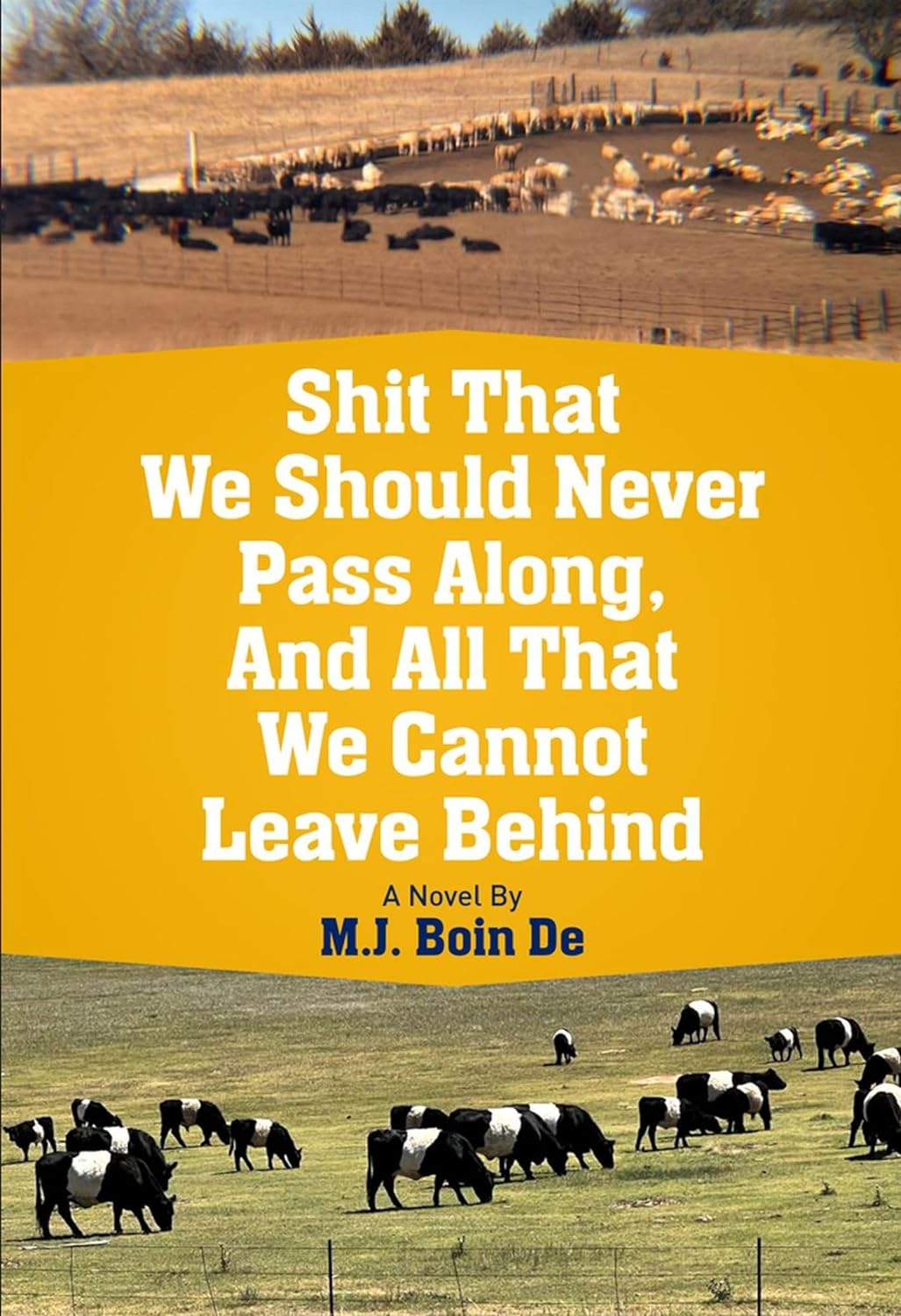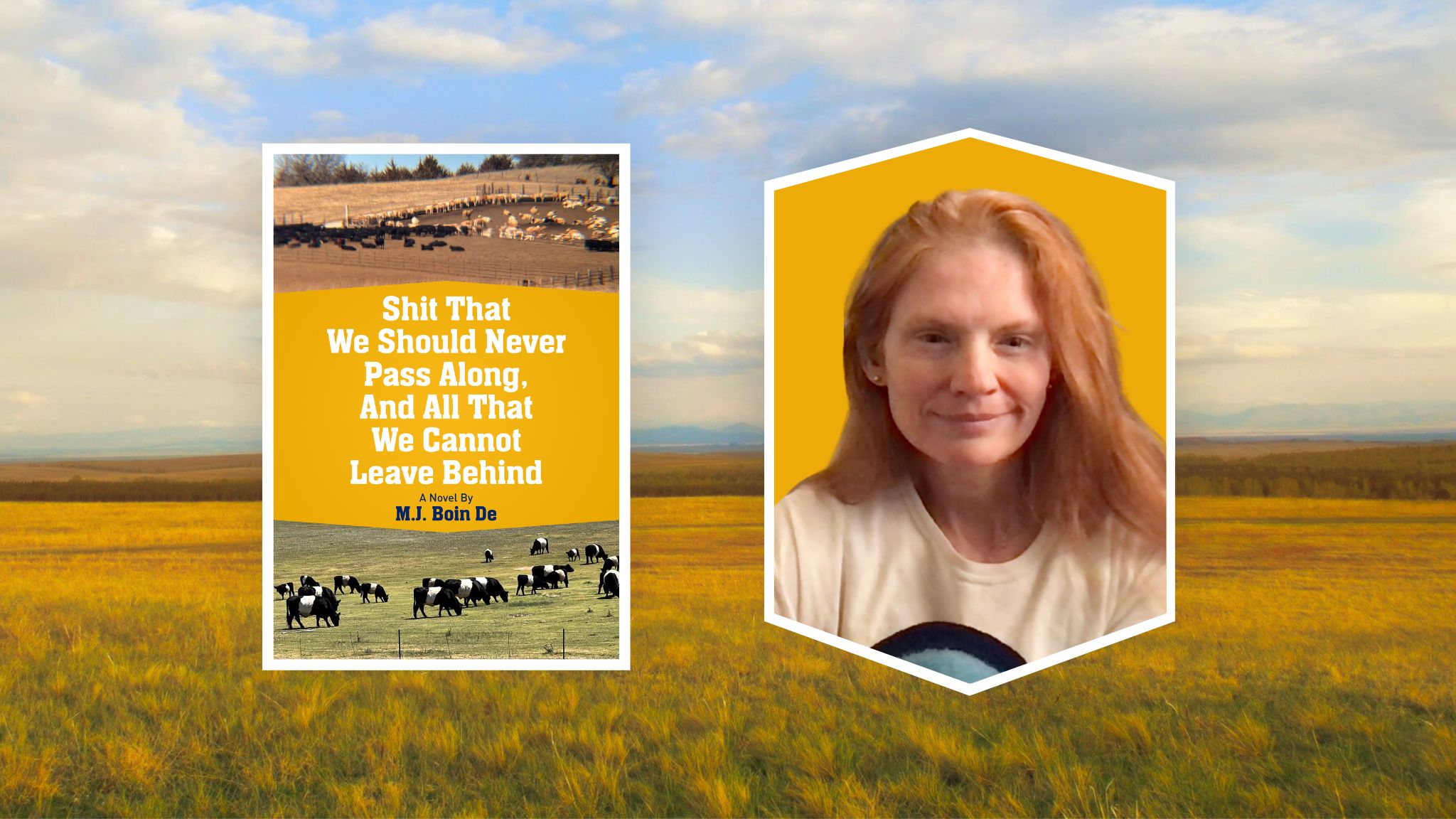Shit That We Should Never Pass Along, and All That We Cannot Leave Behind by M.J. Boin De
There are stories meant to transport us out of reality and somewhere better, giving us a small reprieve from the harsh truths of our world. And then there are stories that reflect those harsh truths and amplify the messiness of reality. M.J. Boin De’s debut novel, Shit That We Should Never Pass Along, and All That We Cannot Leave Behind, is an exemplary model of the latter.
Based on her own life experience, Boin De’s novel takes a raw, unflinching look at the reality of many children dealing with abuse, small-town judgment and the generational divide. The story follows 15-year-old Mara along with her wildly dysfunctional family, often swapping perspectives between Mara and her mother, Gina. This wild mother-daughter duo seem to constantly be at odds with each other, partially because of Gina’s absence due to her working three jobs and Mara being left to care for her younger sisters.
And yet, despite their screaming, fighting and snarky comments — and monthly noise complaints — this is a family that deeply loves each other. While Mara and her mother’s relationship may be taut with many issues, they grow to slowly understand each other by the end of the story.
Read below to learn who exactly Boin De wrote this book for, and how she hopes this book will be able to bring divided generations mutual understanding.
Q: Shit That We Should Never Pass Along, And All That We Cannot Leave Behind is such an engaging story, providing readers with a fairly intimate window into your past. What compelled you to write a fictional memoir?
A: It was past time for me to confront many of the traumas that I faced when I was younger. When I was young, most of us didn’t know anything at all about trauma, or recognize the value of mental health to help us recover from trauma exposure. These days there is still a very significant amount of folks who continue to deny the value and importance of seeking mental health help. We can see some pretty clear dividing lines that exist, generationally speaking, and I believe that many of these lines exist because the older generations are much more resistant to seeking help for events that they have simply learned to “survive and move on from.”
Ultimately, I wrote this novel as a way to address my real life experienced traumas, and acknowledge the fact that without an understanding and an ability to fully and openly embrace mental health help when it was so necessary and needed, my own personal traumas most assuredly continued themselves on and into the next generation, with my own children. That’s the last place I wanted my traumas to live. Therefore, I wrote this book with an enormous abundance of love and hopefulness for my own children, grandchildren, and for future generations in mind.
Q: I imagine the line between fact and fiction can become somewhat blurred while writing something of this nature. How did you balance that?
A: Some of the unfortunate consequences that individuals with Complex PTSD often suffer from include hyper-vigilance and disorganized attachment styles. These things have certainly been true for me in my own real-life experiences. So, to balance out the book, I allow for the trauma pieces to be true telling’s of my real life experienced traumas. However, I refuse to leave the reader in nothing but those intense experiences.
Rather, I chose to balance the book through the use of dark humor. Something that both Boomers and Gen X understand and often utilize when they are discussing or asked to consider either their own or someone else’s very difficult and painful subject matter. While dark humor is something used by the older generations to discuss difficult subject matter (often times without really naming the fact that you’re discussing difficult subject matter), it is also something that our youngest generations, have very correctly identified as “offensive” in nature, and often times something that they demand (rightly so) that their elders put an immediate end to.
What’s often difficult in striking a balance is helping the younger generation to understand that the older generations still find that talking through subjects that the younger generations are much more comfortable talking through for the older generations are often still thought of in terms of “completely taboo” and use of dark humor is often times a way to invite the older generations into a opening those doors so that you can eventually present them with new ideas, new tool sets and new ways of handling subjects that they weren’t previously good at handling.
Q: The story is told through the characters of Mara and her mother, Gina. Given that this is a memoir of sorts, what about Mara and Gina made them the perfect narrators to tell both their stories and yours?
A: The story is based on the complexity of the relationship that I had with my own mother while she was still alive. My mother was from the Boomer generation. She was truly a woman that absolutely believed in the Civil Rights Movement that occurred during her time as a teenager. And, there was never a moment’s doubt in my mind growing up that she wanted her own children to continue driving that push forward into the next generation. However, she was also married to an extremely abusive racist man for over thirteen years, and she did in fact live in a location that actively worked to keep black people outside of a space that they should never have been excluded from at all. It’s just as important to keep the backdrop of what’s going on in mind as it the narration voices. But, having both Gina’s Boomer’s perspective line up against Mara’s Gen X perspective as the surviving victim that isn’t believed, isn’t listened to, and is left to defend herself, is what makes the story such a unique take on trauma telling.
We can see how someone is either set up to succeed or fail within the systems that they are expected to live and function within starting from the very first system that we are each born to. Our family systems are the most important systems that each of us have. When they fail anyone us, that extends onward to the next generation, unless we find ways to shut those failures down. Allowing for the back and forth between Gina and Mara was my way of allowing the reader to consider both generational perspectives. There’s times when the reader will assuredly side with one point of view or the other. There are also times when the reader is assuredly going to just feel like everyone is vile. By the end of the book, I hope that no matter what generation one is from, everyone figures out that there’s always going to be “Shit That We Should Never Pass Along” to the next generation, and there’s always going to be “All That We Cannot Leave Behind” ourselves. I just hope that most folk decided that what we cannot leave behind is one another.
Q: Though you cover some dark themes, you’ve also infused some humor throughout the book. What role do you think humor plays here?
A: I use the dark humor as an invitation for Boomers and Gen X to take another look at why it is the Millennials and the Zoomers believe so passionately in de-stigmatizing Mental Health. Boomers and Gen X are all about the Head, while our wonderful children and grandchildren Millennials and Zoomers are all about the Heart. Sometimes it can feel as though we’re all so very divided from each other. We see that happening throughout Gina and Mara’s story. And, yet, by the end of the story we know that, for as broken and dysfunctional as the family is, Gina and Mara both love their people, and each other above all else. By the end of the book I’ve invited folks to reconsider an update to exactly what “Poverty” is, and to stop pretending as though racism, bigotry, white privilege and abuse of power aren’t all still issues that must be addressed and overcome immediately within our society.
I also invited the Millennials and Zoomers to be a bit more patient and understanding of the fact that their parents, and their grandparents didn’t have access to the same understanding of Mental Health, and other resources, or the same tools that they now have, and feel comfortable using. I ultimately use dark humor on all of the living generations to suggest that instead of cancelling one another out, we might want to consider allowing each generation the opportunity to bring forward that which makes us each the strongest best versions of ourselves together and try building something entirely new out of these vacuumed systems which are old, failing, and breaking down within themselves.
Q: You’ve noted that this is the only memoir you’ll ever publish, but will you continue writing novels? Do you have anything you’re working on right now you can tell us about?
A: I’m excited to say that Shit That We Should Never Pass Along, And All That We Cannot Leave Behind will be Available Exclusively on Audible in January 2024. I’m going to remind our readers that the book comes with lots of trigger warnings. And doubly so once it’s in audible format. And the first of a Series of 3 Historical Romance Novels has been completed. Hidden Jewels: The Opal will be available for purchase in Spring of 2024.
 About M.J. Boin De:
About M.J. Boin De:
M.J. Boin De was born and raised in Kansas City, Kansas. She is a mother before she is anything else. She has a dual B.S. from Kansas State University in Criminology and Sociology. She also holds a Masters Degree in Special Education from Grand Canyon University. Her first published book, Shit That We Should Never Pass Along, And All That We Cannot Leave Behind, is a fictional memoir, with the trauma based in her own real-life experiences.
As a writer, Boin De hopes to continue publishing books that uniquely speak in, to, and through to as many universal experiences that every generation currently living finds relative, meaningful, and evaluative in nature. Her debut book is the only memoir Boin De will publish. But she has no intention of stopping herself from finding ways to address both personal and societal expectations no matter where her next characters find themselves in space and time. Boin De has a strong preference for wiring in mature and controversial themes.




